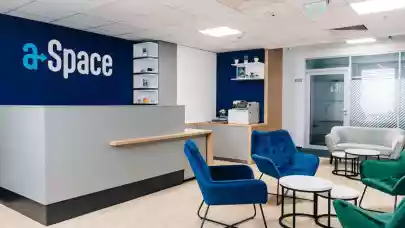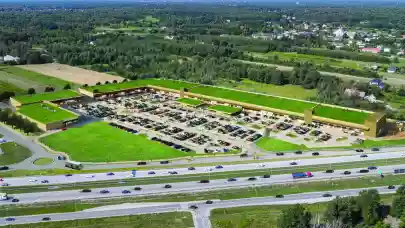
Rustom Vickers, Vice President & Head of Development at Blueground, has talked to Property Forum about the “flexible living” rental model, the changes in the rental market in the post-pandemic era and the expansion plans in the CEE region.
What exactly is „flexible living”, your main field of business? How does it differ from ‘classic’ PRS rental units?
‘Flexible living’ can mean something different to everyone. The origins of Blueground came from a corporate housing solution - a temporary housing for someone, who arrives in the city and is looking for a “landing pad”, before moving to a more permanent accommodation. However, with technological developments and the way we now choose to live, work and play - which was largely transformed by the pandemic – this has really fast tracked a generational change in the way people seek accommodation. “Flexible living” means that people can choose and book a Blueground apartment anywhere for one month or longer. We've even had guests staying for eight years now, so it can also be a long-term solution. Essentially, we provide ready, furnished accommodation on flexible terms. The guests don't have the hassle of dealing with agents or landlords - it's all online, so the technology side makes this solution much more customer-friendly. We're providing a more pleasant and convenient rental experience to the end user, but at the same time, we're providing the landlords a secure income and long-term rents.
How do you convince the landlords to cooperate with You? Short-term leases always seem to be a more profitable alternative…
We're solving a big problem for them: dealing with the tenant. Because typically, landlords don't like that part of the business. They like to invest in the asset and get the return on investments. They often don't want to handle customers and the operational challenge to keep them happy in their homes. We have this problem solved.
We also do not compete with short-term leases, nor are we suited to resort locations, vacation homes or seasonal leases. Our business model works in the big cities. Right now we have 15,000 apartments in 32 cities across the globe. We really can attract landlords to give their units to us mainly for the two reasons that I mentioned – tenant service and long-term leases. The average length of our deal with a landlord is five years, but it can be indefinite.

Rustom Vickers
Vice President, Head of Development
Blueground
While it might seem that the hybrid working model will stay with us forever, companies are increasingly pushing their employees to spend at least 2-3 days a week physically in the office. In the long term, could this trend be a threat to your business model?
I think it is the contrary - this is what has boosted the demand for our services. Before the pandemic we had around 2,000 apartments, now we have 15,000 due to the rapid demand increase. And it's also because the demand is much more diversified and it's no longer a pure corporate housing B2B solution. We're also now catering to a broader range of B2C guests, and that is because people are able to be more flexible and choose where they do their work day to day.
The pandemic and the subsequent increase in working from home has certainly emphasised the importance of the home environment. If you are working three days out of five at home, you want a nice place. So people are willing to invest more in better accommodation. And that's where our high-quality apartments are stepping in. We’re seeing more people moving back to big cities to go into the office, and at the same time they are looking for a more flexible solution and an alternative to the traditional lease model.
Blueground in Europe has so far mainly developed in Western European countries. Do you have any plans for the expansion into the CEE region?
Yes, absolutely. We recently entered into a partnership agreement for Prague and are planning to launch our services there this summer. That will be our first Eastern European city, but we're also targeting Warsaw, Budapest and Bucharest and are seeking local partners to work together with to enter these cities. Essentially, our business model would work in any major city.
Typically, we grow with 10 to 15 apartments per month per city. So in Prague, we hope to end up with around 70 to 100 apartments by the end of the year. And the target for Prague is 3,000 units, we see that there is a demand for this kind of accommodation. The same goes for other CEE cities. I would say Vienna is the best example. We opened our branch there three years ago, and now we have over 350 apartments in that city. We’ve proven that this business model is really strong and sustainable there.
Corporate clients or digital nomads? Which of these groups of Blueground customers here will grow more dynamically in the near future?
We are primarily catering to multinational companies that have increasing back offices or even front offices in these eastern European cities. Honestly, the digital nomad is still not a mainstream customer. They amount to just 8% of our customer base. Digital nomads are people who work freelance or are completely non-associated with any corporation. They usually stay more at co-living or shared accommodation places, because they are more price-sensitive. Our core customers are the corporate tenants, like people who work for big consultancy firms, banks, large tech companies etc.
How do you introduce sustainable development ideas in Your business model?
We don't own our assets, we operate in the rent-to-rent business. Therefore, we can only really control the fit-out and operation of the apartments and we do a lot in terms of mitigating the supply chain impact and optimising operational efficiency.
What are the biggest challenges Blueground will face in the next 12 months?
In the end, we are reliant on an open, globalized world with no borders. The freedom of movement supports our business. Hopefully the geo-political tensions cool down and allow people to freely choose which city in the world they would like to live in.
And what are the biggest opportunities you see on the horizon?
We see a real chance to go from 32 cities today to 60 cities in the next couple of years working with local partners. In the end, this is a global business that feeds on global scaling. So if we're in Budapest or Warsaw, that allows us to cater better to our existing and growing clientele. For us, the most important opportunity is to become the first truly worldwide company providing flexible living services in all the most important global cities.



